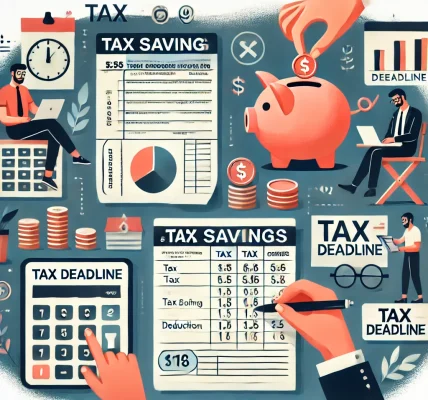Introduction
Financial literacy is an essential skill in today’s world, helping individuals make informed decisions about budgeting, saving, investing, and managing debt. Whether you’re just starting your financial journey or looking to enhance your money management skills, enrolling in a financial literacy course can be a game-changer.
In this blog, we’ll explore some of the best financial literacy courses available for beginners, focusing on their features, benefits, and what makes them stand out. These courses are accessible, affordable, and designed to provide foundational knowledge that can help you achieve financial independence.
Why Financial Literacy Matters
Before diving into the best courses, let’s understand why financial literacy is so crucial:
- Improves Money Management: Helps you create budgets, track expenses, and save effectively.
- Reduces Debt: Educates you on managing loans, credit cards, and avoiding financial pitfalls.
- Encourages Smart Investing: Provides basic knowledge about stocks, bonds, mutual funds, and retirement planning.
- Boosts Financial Confidence: Empowers you to make informed decisions without relying on financial advisors.
- Prepares for Emergencies: Helps in setting up emergency funds and planning for unforeseen expenses.
Best Financial Literacy Courses for Beginners
1. Coursera – Financial Planning for Young Adults
Platform: Coursera
Offered by: University of Illinois
Duration: 4 weeks
Cost: Free (with an option for a certificate)
Key Features:
- Covers essential topics like budgeting, saving, and investing
- Self-paced learning
- Designed specifically for beginners and young adults
- Includes real-life financial scenarios
This course provides a strong foundation for anyone looking to take control of their finances early in life.
2. edX – Personal Finance
Platform: edX
Offered by: Purdue University
Duration: 5 weeks
Cost: Free (with an option for a certificate)
Key Features:
- Covers the basics of financial planning and money management
- Explains debt management and credit scores
- Teaches investment fundamentals
- Includes interactive exercises for practical learning
This course is great for beginners who want an academic approach to personal finance.
3. Udemy – Personal Finance 101: Everything You Need to Know
Platform: Udemy
Instructor: Steve Ballinger, MBA
Duration: 3.5 hours (self-paced)
Cost: Around $20 (often available on discount)
Key Features:
- Beginner-friendly lessons on budgeting, saving, and investing
- Covers credit, loans, and retirement planning
- Lifetime access to materials
- Engaging video content and quizzes
Udemy’s flexible learning model makes this an excellent choice for busy individuals.
4. Khan Academy – Personal Finance
Platform: Khan Academy
Duration: Self-paced
Cost: Free
Key Features:
- Comprehensive coverage of financial basics
- Simple, easy-to-understand explanations
- Covers taxes, banking, credit, loans, and investing
- 100% free with no hidden costs
This course is an excellent resource for beginners who prefer a completely free, high-quality educational experience.
5. Alison – Introduction to Managing Your Personal Finance Debts
Platform: Alison
Duration: 2-3 hours
Cost: Free (with an option for a certificate)
Key Features:
- Focuses on debt management and financial responsibility
- Provides practical advice on budgeting and expense tracking
- Ideal for those struggling with debt issues
If managing debt is your primary concern, this course is highly beneficial.
6. The National Endowment for Financial Education (NEFE) – Smart About Money
Platform: Smart About Money (NEFE)
Duration: Self-paced
Cost: Free
Key Features:
- Offers multiple financial literacy modules
- Covers savings, debt management, and financial goal setting
- Provides interactive tools and quizzes
- Ideal for beginners looking for an in-depth yet easy-to-follow resource
This course is one of the most comprehensive free financial literacy programs available online.
How to Choose the Right Financial Literacy Course
With so many options available, here are some factors to consider when selecting a course:
- Your Learning Style: Do you prefer video lectures, interactive lessons, or written materials?
- Your Financial Goals: Are you looking to improve budgeting skills, learn about investing, or manage debt?
- Time Commitment: Do you want a short course, or are you willing to commit several weeks?
- Cost: Free courses are great for beginners, but some paid courses offer extra features and certification.
Tips for Maximizing Your Learning Experience
- Set Financial Goals: Before starting a course, identify what you want to achieve, such as saving for a car or understanding investments.
- Take Notes: Keep a financial journal to record key takeaways and action points.
- Apply What You Learn: Implement budgeting techniques, track expenses, and practice investing with small amounts.
- Stay Consistent: Financial literacy is a lifelong journey—keep updating your knowledge regularly.
- Join Online Communities: Engaging in financial forums or groups can help reinforce learning and provide real-world insights.
Conclusion
Investing in financial literacy is one of the best decisions you can make for your future. Whether you’re looking to create a budget, pay off debt, or start investing, the courses listed above provide valuable insights and practical knowledge to help you take control of your finances.
Start today with one of these top-rated courses and take the first step towards financial independence!



